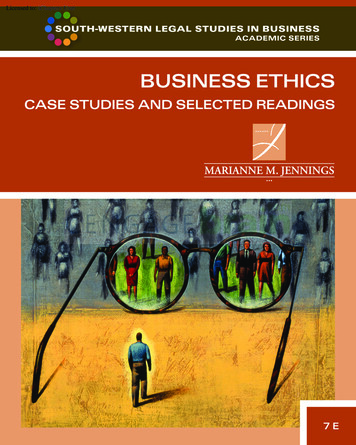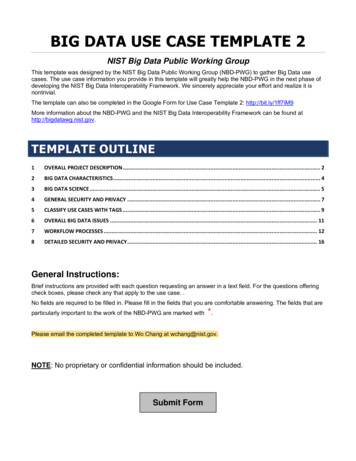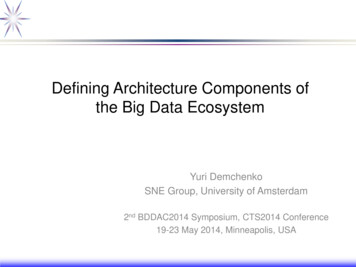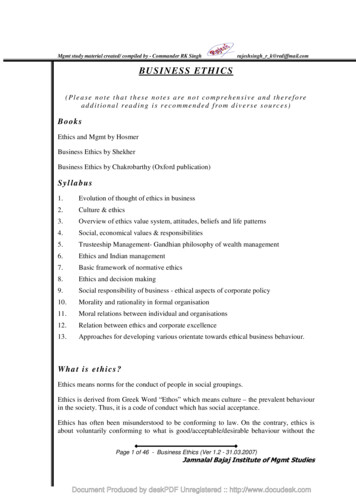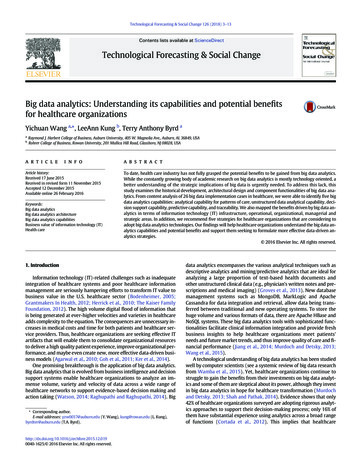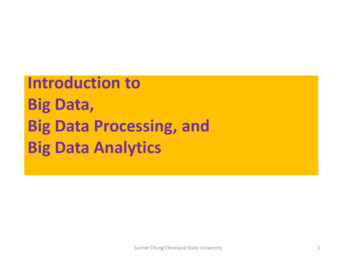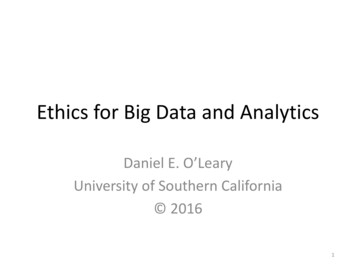
Transcription
Ethics for Big Data and AnalyticsDaniel E. O’LearyUniversity of Southern California 20161
With Big Data and Analytics May ComeOpportunities 2
Big Data has Led to Some Good Newsand Bad News - 1
Big Data has Led to Some Good Newsand Bad News - 2
Ethics in the World Ethics and computer ethics manifestthemselves in the world as “codes of ethics”and “codes of conduct” developed by differentorganizations.– Companies build codes of conduct and ethics– Professional organizations build codes of conductand ethics– Is anyone aware of such codes of conduct?5
Codes of Conduct6
Purposes of Codes of Ethics Thomas Wotruba and colleagues and others havesuggested that such codes of ethics have at leastthree purposes. Whenever a group puts togethera code of ethics, it indicates that the group is– concerned about ethics– transmitting the specific set of ethics to its group, and– ultimately affecting the group’s behavior. In addition, codes of ethics provide a signal tothose that interact with the relevant group as towhat to expect of the group members.7
Issues / Questions Is there a need for “big data” or “analytics”ethics or codes of ethics?– Is “regular” ethics enough?– Is “computer ethics” enough?– Does anyone already do big data / analyticsethics?– What would be a definition of big data / analyticsethics?8
Computer Ethics Wikipedia defines computer ethics as “a part ofpractical philosophy (concerned with) howcomputing professionals should make decisionsregarding professional and social conduct.” James Moor defined it as “the analysis of the natureand societal impact of computer technology and thecorresponding formulation and justification of policiesfor the ethical use of such technology.” These definitions suggest a strong tie between ethicsand professional conduct and an approach forinfluencing that conduct through policies and rules.– Determine what are those policies and rules9
History of Computer Ethics Computer ethics has a history going back to the 1940s.Some researchers have argued that Norbert Wienerwas among the first to suggest the notion of “computerethics” (although he did not use the term “computer”). “It has long been clear to me that the modern ultrarapid computing machine was in principle an idealcentral nervous system to an apparatus for automaticcontrol Long before Nagasaki and the publicawareness of the atomic bomb, it had occurred to methat we were here in the presence of another socialpotentiality of unheard-of importance for good and forevil.”10
Two Points of View - Computer Ethics There is the equivalence of a debate in computer ethics regardingthe role of computer ethics in the broader view of ethics. “Wiener–Maner–Górniak perspective”– Sees computer technology as ethically revolutionary, requiring humanbeings to re-examine the foundations of ethics and the very definitionof a human life.– This perspective suggests that there is a need for a special branch ofethics for computer ethics. Johnson provides a more conservative perspective.– In that point of view, fundamental ethical theories will remainunaffected—that computer ethics issues are simply the same oldethics questions with a new twist— and consequently computer ethicsas a distinct branch of applied philosophy will ultimately disappear.11
Codes of Ethics and Conduct Relatedto Computers, Analytics and Big DataOrganizationDocumentationIEEEEthicsACMACM Code of Ethics and Professional -professionalconduct)British Computer Society CodeofConductData Science Association -of-conduct.html)MembersConductINFORMSforthe Code of Ethics for Certified Analytics ProfessionalsCertifiedAnalytics canAssociationStatistical rMay08/ ASAEthicalGuidelinesforStatisticalPractice.pdf)12
Problems with Computer Codes ofEthics Which one(s) do I use? If I am a member of multiple societies, whichdominates? Or, do I use all of them. How do I determine which “fits” best? Is a computer code of ethics enough? Do Ineed a specific big data or analytics (or both)code of ethics?13
Case for Specific Big Data and AnalyticEthics (3 Primary Issues)1. Computing ethics are about the computing artifact,while big data and analytics are about the data andwhat is done with it2. The existence of specific codes of conduct foranalytics and big data provide empirical evidence thatthey are different than computing ethics3. The lack of specificity in computing or general ethicsfor big data and analytic issues, suggests a need forbig data and analytic codes of ethicsDrill down 14
1. Computer Ethics vs. Big Data Analytics“Computing Artifact vs. Data” Because there is controversy with computerethics compared to general ethics frameworks,there can be a controversy over whether issuessuch as big data and analytics belong in computerethics, or if they should be treated on their own. The initial focus of the need for computer ethicsappears to have centered on the nature of thecomputing artifact.– As Wiener noted, “Cybernetics takes the view that thestructure of the machine or of the organism is anindex of the performance that may be expected fromit.”15
1. Computer Ethics vs. Big Data Analytics“Computing Artifact vs. Data” However, the focus on big data is more concerned withwhat is being processed, the nature of what is beingprocessed, the findings of analyzing the data and who theprocessing is being done for or by.– For example, big data has characteristics of volume, velocity,and variety, distinguishing it from other information beingprocessed, such as transaction data. In addition, big dataprojects could be for individuals, organizations, or clients. As aresult, issues such as data confidentiality and privacy can be aconcern. Thus, computing ethics relates to the computer artifact,while big data relates to the data and analytics to the waythat data is analyzed.– The artifacts are different16
2. Analysis of Analytics and Big DataCodes of Conduct (1/2) The codes of ethics provide “empirical” evidence of thepotential importance of a specific focus on big data ethicsas compared to computer ethics or more general forms ofethics. First, the numbers of different codes of conduct for big dataare one signal that there is something different about bigdata. Second, codes of conduct relating to big data come frommultiple disciplines (not just computing): computing,statistics, operations research, and data science.– Big data and analytics appears to be multidisciplinary.– Some of those disciplines do not directly derive fromcomputing.17
2. Analysis of Analytics and Big DataCodes of Conduct (2/2) Third, in some cases the codes of conductestablish a vocabulary to ensure theappropriate communication of key concepts.– Perhaps the Data Science Association provides themost comprehensive vocabulary. Thus, the codes provide empirical evidence ofdifference18
3. Lack of Specificity in Codes ofConduct Still another approach to ascertaining the extent to whichbig data ethics differ from other ethics frameworks is toapply existing general ethical frameworks or more specificcomputer ethics frameworks to big data ethics issues. As an example of using an existing general ethicalframework to generate and facilitate analysis of ethicalissues in big data, David Ross laid out seven basic axioms ofright and wrong conduct. Two of those axioms potentially relate to analysis of bigdata:1.2.One ought to do what one can to improve the lot of others.One ought not to injure other people.19
3. Lack of Specificity in Codes ofConduct It can be argued that many applications of big data areaimed at the first item (“improve the lot of others”). As an example, Jamie Cattell and colleagues argue thatbig data is being used to transform the United Stateshealthcare system, improving pharmaceutical drugresearch with more timely, less constrained, and moreeffective analysis.– Big data allows analysis of both the main effects and sideeffects of drugs, facilitating greater innovation. As another example, big data can be used to facilitatesmart cities, gathering sensor data from the Internet ofThings (IoT) to facilitate improved city management20
3. Lack of Specificity in Codes ofConduct Another approach is to apply a general computerframework to big data, such as the Ten Commandments ofComputer Ethics. Of the 10, two appear potentially to applydirectly to big data:3.4.Thou shalt not use a computer to harm other people.Thou shalt not use a computer to bear false witness. We can compare these principles to better understand thesimilarity of the two frameworks.– #3 and #4 could easily be made more general (“thou shalt notbear false witness”).– #1 is positive, whereas 3 and 4 are negative, suggesting thatalthough general ethics frameworks may include positive rules,the more specific computer framework is largely negative,indicating what not to do.21
3. Lack of Specificity in Codes ofConduct Both of these approaches illustrate that ethical frameworkscan be applied to big data concerns. However, these ethicalframeworks are focused on other settings, thus limitingtheir effectiveness for big data. These approaches illustrate that the application of suchframeworks does not capture the full scope of ethicalissues in big data. Perhaps the primary limitation is the lack of specificity thatcomes from applying an ethics framework that is moregeneral than the use capabilities of a specific technology,such as big data.– As an example of greater specificity, the Data ScienceAssociation’s code of conduct provides more ethical rules thatdirectly draw on knowledge from the specific discipline22
Specificity in Big Data and AnalyticCodes of Ethics General codes of ethics and codes of conductare not aimed at issues of concern with bigdata and analytics.23
Definition of Big Data and AnalyticsEthics (1/2) This discussion suggests that big data ethics differ fromgeneral ethics and computer ethics, as illustrated by– the differences between the artifacts,– the different emerging codes of ethics, and– the lack of specificity in existing computer or general ethicalframeworks. Because of these differences, based on the previousresearch, I generated a potential parallel definition for bigdata ethics as “the analysis of the nature and societalimpact of big data technology and the correspondingformulation and justification of policies for ethical use ofbig data.”– Similarly for analytics24
Definition of Big Data and AnalyticsEthics (2/2) Such a definition treats computing and big dataas different technologies that require differentsets of policies.– Unfortunately, with the development of a newtechnology, people and organizations do not fullyunderstand what kinds of behavior to expect.– As a result, the rules and policies in place might notprovide the appropriate guidance and control overbehavior and might require greater specificity.– Codes of ethics can be developed to provide thoseguidelines.25
Extension to Other Technologies Ultimately, this discussion is bigger than big dataor analytics and can be generalized to a range ofother types of technologies. For example, there is movement toward codes ofethics being designed around other technologies,such as the IoT (Internet of Things) Although many see the IoT as a source of issuesassociated with big data, it is likely that there willbe important ethics specificity that can begenerated for the IoT technology through its owncode of ethics.26
Codes of Ethics and Technology LifeCycles Furthermore, at one level, the existence of a code ofethics or conduct provides a signal as to where atechnology is in its life cycle. Codes are developed, in part, to provide constraints onbehavior.– Thus, development of codes of ethics indicates use of atechnology and development of a set of rules to controlthat usage behavior. In general, the further along in the life cycle, the morelikely the existence of one or more codes of ethics, andthe more stable those codes are likely to be.– The further in the life cycle the more we know about whatcan go wrong, and what is needed to be constrained.27
Summary Big data and analytics provide a setting forcodes of ethics designed around the specifictechnologies:– “The analysis of the nature and societal impact ofbig data technology and the correspondingformulation and justification of policies for ethicaluse of big data.”28
Questions?29
1. Computer Ethics vs. Big Data Analytics “Computing Artifact vs. Data” However, the focus on big data is more concerned with what is being processed, the nature of what is being processed, the findings of analyzing the data and who the processing is being done for or by. –For example, big data has characteristics of volume, velocity,File Size: 725KB
